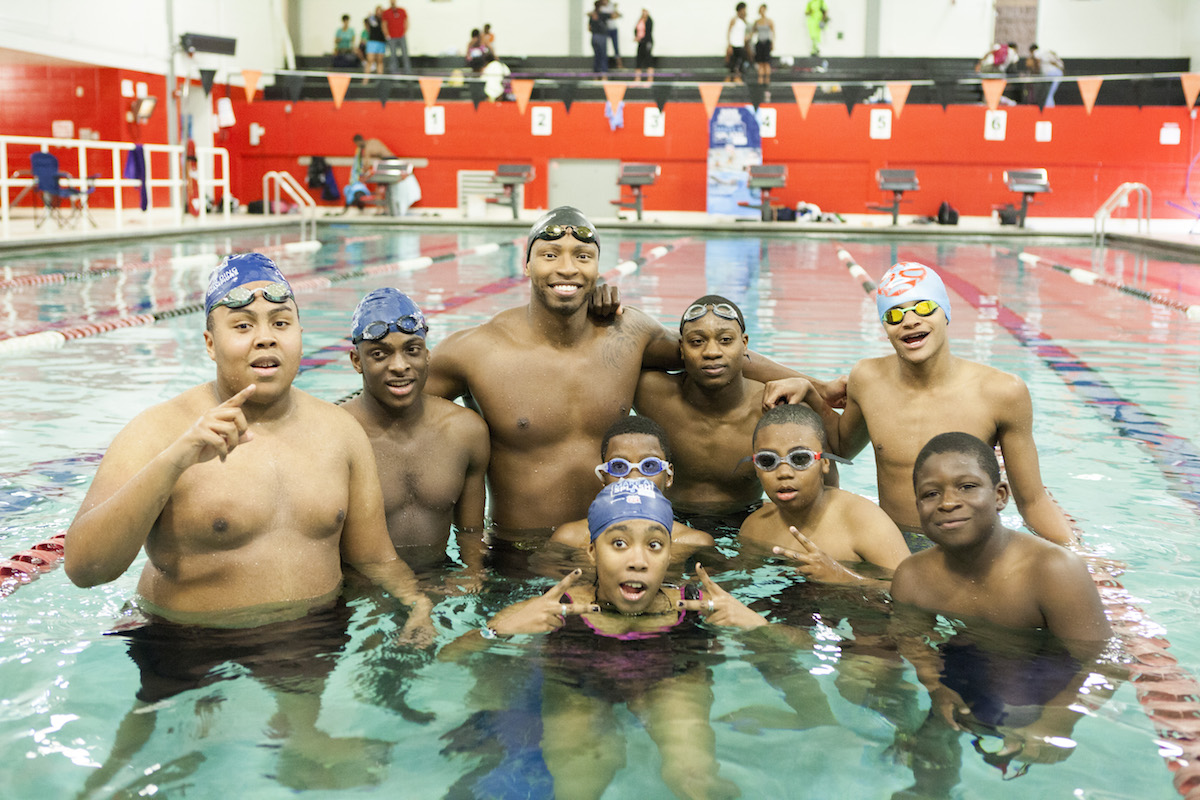In the race of her life, Simone Manuel stunned Rio Olympics spectators when she finished first in the 100-meter freestyle last Thursday night, becoming the first African-American woman to win an individual swimming gold medal.
The 20-year-old Stanford student tied with Canada’s Penny Oleksiak and set a new Olympic record at 52.70, finishing her first Olympic Games with two golds and two silvers overall.
Two-time Olympian Cullen Jones knows a little bit about making history at the Games, too—and also about being a trailblazing African-American swimmer in an overwhelmingly white sport. Joking that he’s been called “the black swimmer” for almost a decade, the 32-year-old initially struggled with the title, but ultimately embraced it while accumulating two Olympic golds and two silvers over trips to Beijing in 2008 and London in 2012. He was also on the 2008 4×100-meter freestyle relay team, which broke and still holds the world record.
Since 2009, Jones has been involved with the USA Swimming Foundation’s Make a Splash program, which promotes water safety by providing opportunities for children across the country to learn to swim.
Despite failing to qualify for Rio, Jones said he watched all of the Olympic swimming events last week from his home in Charlotte, North Carolina. In an interview with VICE Sports, he reflected on Manuel’s history-making swim, how her overall performance in Rio will affect the sport, and his own experiences with USA Swimming.
VICE Sports: Although Simone was third at the halfway point of the 100 free, what was going through your mind as she pulled ahead in the last few meters?
Cullen Jones: I was a little nervous going into the wall because [event favorite] Cate Campbell didn’t go out too fast, but she was definitely ahead of the whole field. To see Simone close the way she did, I knew she timed it well.
It was an amazing swim. I literally jumped up and almost broke my ceiling fan. It was a really cool moment, especially for her.
In a race with Australian sprinters Cate and Bronte Campbell—as well as the Netherlands’ defending Olympic gold medalist Ranomi Kromowidjojo—were you surprised Simone touched first?
Those were the studs when it came to the 100 freestyle and the 50 freestyle, and I was blown away. It takes a special kind of girl to go against that and say, “I’m going to still put my hand on first. No matter who you might be coming into the meet, being [ranked] first, it doesn’t matter. I’m leaving with the gold medal.” I know Simone well enough to know that’s where her mindset was.
With four Olympic medals, what impact do you think that has on the sport and African-American women and girls?
It can only be positive. I know that when she comes home, that’s when I think everything’s going to hit her…. What she’s actually done is change the face of swimming. She’s an instant icon. There are going to be young girls that look at their parents and say, “I want to be like her,” and that’s an amazing, beautiful thing.
It’s something special that Simone did—being the first African-American female to have a gold medal individually. I got a lot of slack for saying that on Instagram and on Twitter. People said, “Race doesn’t matter,” and I agree with that, but you can’t take it away that she’s the first person to do that ever.
I am so proud of @simone_manuel First African American female to get a GOLD medal. Amazing #TeamUSA
— Cullen Jones (@CullenJones) August 12, 2016
You were criticized for giving her a shout-out for that?
Oh yeah, and some people were just nitpickers. People said, “Well, in swimming.” And I think it’s implied that there are many African-American females who have won individual gold medals in other sports, but we’re talking about swimming.
I’m watching the news just like anyone else, and race is a hot topic right now. And a lot of people came back at me and said, “It shouldn’t matter about race,” and it shouldn’t, but you can’t deny that she is the first African-American to do this.
From your own experience, can you explain a little how she might feel on a mostly white team?
Absolutely, and the reason why I think I can is I’ve lived that life. I understand. I was 15 when I was on my first predominantly white team. I was at a Jewish community center, and I was the only black swimmer there, and I’m sure she’s had the same road—it just comes with the sport. There’s nothing wrong with that, but I think with swimmers like her, like myself, like Maritza Correia McClendon, that’s going to change the scope of swimming. I think it will be more diverse as time goes on.
Why do you think the U.S. national teams and Olympic teams have historically lacked diversity?
There are teams of African-Americans that swim and love the sport, and with the stigma of black people don’t swim, I’m so thankful people are now seeing someone like Simone getting a gold medal. That can be thrown out because that’s exactly what it is—a stereotype.
That’s how I started getting into swimming. I was on a super-diverse team. But the reason I think there’s a drop off is the transition from elementary school to high school, from high school to college, from college to the Olympic level. There’s a drop-off at each one of those sections, and I think the reason is people have to start asking, “Can I see a future in this? Do I see a future in this?”
When you have swimmers like me and Simone and Maritza that get to the level of being in the Olympics, yeah, there’s a future. And that’s why I think you’re going to see more and more swimmers continuing to stay in swimming.
Do you think Simone’s success, as well as your own, will have an impact on the swimming community in the future, particularly for African-Americans?
Absolutely. With the USA Swimming Foundation and the Make a Splash initiative, that’s been my goal since 2008 when I got my gold medal—to try and spread the word because the drowning rates are so bad. African-Americans are nearly three times more likely to drown than any other race…. It’s going to take initiatives like that and the platforms that we build through our performances to get this positive word out.
It doesn’t matter what your skin color is or what your body makeup is. Anyone can learn to swim, and most importantly, it’s not just about learning how to swim—it’s a life skill. This is something that when you learn to do, you never forget it.
According to USA Swimming, nearly 70 percent of African American children can’t swim, compared with 40 percent of white children. Why do you think the difference is so large today, and why are those numbers so high in general?
If you line up ten African-American kids, seven of those ten won’t know how to swim. It’s harsh to put it that way, but it’s the truth. It’s so staggering, and when you put that image in people’s minds, it’s a big deal and it’s a big problem.
I think the reason is because we don’t see swimming as a life skill in the U.S … and we need to change that. Fortunately, we’re trying to do this before an unfortunate incident happens. People understand how important swimming is after something has already happened. What we need to do is get ahead of that, and it’s simple. It’s just swim lessons.
If a parent of a child doesn’t know how to swim, there’s a 13 percent chance that child won’t learn how to swim. If the parent does know how to swim, there’s an 88 percent chance that child will learn how to swim. That’s a huge gap. For those 4 million kids that learned how to swim [through Make a Splash], they’re going to have children, and when they [do], they’re going to teach them how to swim. That’s how you start to move that needle.
Does something like segregation still have an impact today on the number of people who know how to swim and compete?
I think it had a huge impact, and I think a lot of people, unfortunately—and I will take probably some slack for this—still try to use that as a crutch as to why they don’t know how to swim.
I think today, in this day and age, segregation is not an issue. You can go out there and learn how to swim, but it’s about making it a necessity and making it important for that person.
Yes, segregation was a big problem and people were told, “You don’t do this.” But those days are over. You can go to your local [YMCA], you can go to your local pool and ask a lifeguard or a teacher to learn how to swim. So now it’s about making it a necessity and making it a life skill.
How has your experience of nearly drowning as a child affected your swimming career and motivation to help others learn to swim?
That was really a big motivation for me to start working with the Make a Splash initiative. I was five years old when I almost drowned. I was under water for 30 seconds, and they say it only takes a child 20 seconds to have brain damage.
My mom started crying when I told her I got a job at 15. She asked what I was doing and I said, “I’m lifeguarding and I’m giving swim lessons.” And she cried and told me the story of me almost drowning because I don’t really remember it. When she went into detail, I saw what she went through that day. She relived it by telling me that, and I don’t want to see any parent have to go through that. She almost lost me that day but I feel like my life has come full circle. I almost drowned and thankfully for that lifeguard that saved me, now I’m the one doing the saving.


